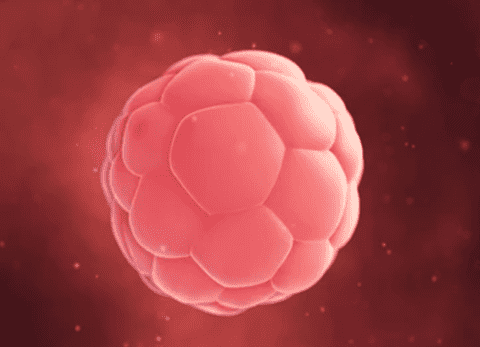Going on the journey to become parents through IVF (In Vitro Fertilization) is a big and exciting step. One important part of this journey is something called a blastocyst transfer. You might have questions like “What is it?”, “What are the chances of pregnancy after blastocyst transfer?”, and “What can affect your chances?”
A blastocyst is a tiny ball of cells that forms about five to six days after the egg is fertilized. This stage is special because the doctors can see which embryos are the strongest and most likely to grow, which might help you get pregnant.
But there are a few things that can change your chances, like how healthy the embryos are, how ready your womb is, how old you are, and other health issues that are unique to you.
Becoming a parent is an important part of one’s life. Nisha IVF is a leading fertility clinic dedicated to helping individuals and couples achieve their dream of parenthood. We have the latest technologies for IVF, IUI, ICSI, and others.
With a team of experienced specialists and state-of-the-art facilities, we can provide personalized care and support throughout your fertility journey.
Book your appointment with us today and get one step ahead to start your family!
Going on the journey to become parents through IVF (In Vitro Fertilization) is a big and exciting step.
But what exactly happens during this process? Let’s dive in.
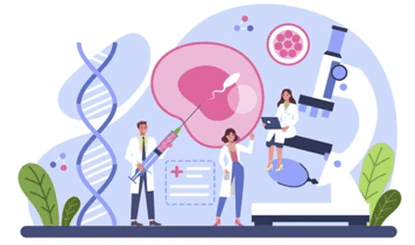
Understanding Blastocyst Transfer
Blastocyst transfer is a key step in IVF that could help you on your journey to becoming a parent.
Imagine a tiny ball of cells, about 5-6 days old. That’s a blastocyst. It’s special because it’s just about ready to get transferred into the womb. This stage helps doctors spot the strongest little ones.
Going for a blastocyst transfer could make your pregnancy chances better. It has a success rate of 50%. It’s like picking the best apple from the bunch — it gives you a head start!
If you’ve got a few embryos to choose from, this might be for you. It’s better for folks under 35, but everyone can see the benefits.
Dive into the world of blastocyst transfer. It’s a big plus in the IVF process, offering a brighter hope for parents-to-be. Ready to learn more? Let’s start this adventure together.
Contact us for expert guidance tailored to your needs!!
So, the big question is – can this lead to pregnancy? Let’s break it down.
Can you get pregnant after embryo transfer?
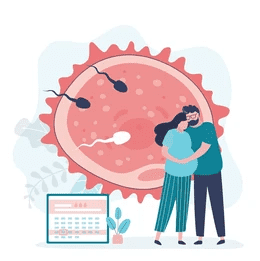 Yes, you can get pregnant after an embryo transfer. This step is a big part of the IVF process and it’s all about giving you the best shot at becoming pregnant. The good news is that the chances of pregnancy during IVF are pretty good. About 25% to 60% of these transfers result in blastocyst implantation leading to pregnancy. Keep in mind that, your age, how healthy the embryos are, and the IVF method used can make these numbers go up or down.
Yes, you can get pregnant after an embryo transfer. This step is a big part of the IVF process and it’s all about giving you the best shot at becoming pregnant. The good news is that the chances of pregnancy during IVF are pretty good. About 25% to 60% of these transfers result in blastocyst implantation leading to pregnancy. Keep in mind that, your age, how healthy the embryos are, and the IVF method used can make these numbers go up or down.
Here’s the simple version: after the doctor puts the embryo into your uterus, it needs to attach itself to the wall of your uterus to start the pregnancy. This is when it gets real! To help things along, staying healthy, listening to your doctor, and keeping a hopeful heart can make a big difference.
Every person’s journey is different, so your experience might not match someone else’s exactly. The best thing to do is focus on what you can control and lean on your doctor for advice and support.
Talk to a fertility specialist today!! You may visit us to learn more about your options and chances of pregnancy!
Evaluate and decide!! The success rates might help you!
What is the success rate of pregnancy after blastocyst transfer?
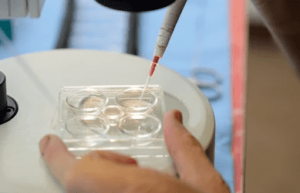 The chance of pregnancy after blastocyst transfer is pretty good, especially if you’re under 35. For younger women, the success rate is about 50-60%. This means out of 100 women, about 50 to 60 will get pregnant after blastocyst transfer.
The chance of pregnancy after blastocyst transfer is pretty good, especially if you’re under 35. For younger women, the success rate is about 50-60%. This means out of 100 women, about 50 to 60 will get pregnant after blastocyst transfer.
A blastocyst transfer happens about five to six days after the egg and sperm combine. It’s a crucial step because only the strongest and healthiest embryos make it to this point, so they have a better shot at blastocyst embryo implantation to the womb and growing into a baby.
But age matters a lot. For women over 40, the chance drops to about 20-35%. So, it’s a bit tougher but still possible.
If you are considering this option, discuss your condition and chances with an expert. In case you are confused about where to find good experienced doctors, contact us.
Wondering what might increase your chances? Here are the factors.
Factors Influencing Pregnancy After Blastocyst Transfer
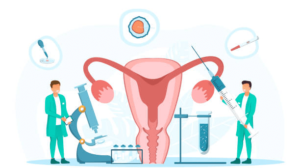 Thinking about IVF and the blastocyst transfer? Let’s look at what affects your chances of getting pregnant after this key step.
Thinking about IVF and the blastocyst transfer? Let’s look at what affects your chances of getting pregnant after this key step.
- Your age plays a big part. If you’re under 35, your chances are better. Over 42 the chances drop to less than 5%. Younger eggs tend to be healthier.
- Healthy embryos have a better shot, with success rates often above 50%. Doctors pick the best ones to increase your chances.
- Your womb needs to be ready and welcoming. Issues like endometriosis can lower your chances. A good, healthy womb lining helps a lot.
- Smoking, drinking, and being overweight aren’t helpful. Cutting these out can boost your chances by up to 20%.
- If you’ve been pregnant before or had successful IVF, you might have better odds. If it’s your first time or you’ve had troubles, it could be different.
- Sometimes, it’s about your genes. Testing embryos for genetic health can help pick the best one, increasing success rates.
Every journey to becoming a parent is unique. Knowing these factors can help you feel more in control and hopeful. Got questions? Now’s a great time to ask and learn more. Your dream might be closer than you think!
After the transfer, then what? Here are some lifestyle tips to keep in mind.
Post-Blastocyst Transfer Lifestyle Tips
 After a blastocyst transfer in your IVF journey, here are some easy tips to keep in mind:
After a blastocyst transfer in your IVF journey, here are some easy tips to keep in mind:
- Stay happy and Relaxed. Keeping stress low is super important. Try things that make you feel calm, like yoga or listening to your favorite music.
- Eat Well: Fill your plate with good stuff like fruits, veggies, chicken, and grains. Foods with folic acid and omega-3s are great for you.
- Move a Little: Gentle activities are your friend. Think about taking nice walks or doing some easy yoga. But, it’s best to skip any hardcore gym sessions for now.
- Drink Water: Lots of it! Being hydrated helps your body function well.
- Cut Back on Coffee and Skip the Alcohol. Try to keep coffee under one cup a day and it’s best to just avoid alcohol.
- No Smoking: Smoking is not great for fertility, so avoiding cigarettes can increase your chances.
- Listen to Your Doctor: They might give you special instructions, like when to take medicine or if you need to rest more. Make sure you follow what they say.
And remember, these tips can help, but everyone’s different. Keeping in touch with your doctor is the best plan for personal advice.
Wish to talk to someone about your fertility issues? Get in touch with our expert specialists today!
Do you feel like you need a bit more guidance? Monitoring and support are key.
Monitoring and Support
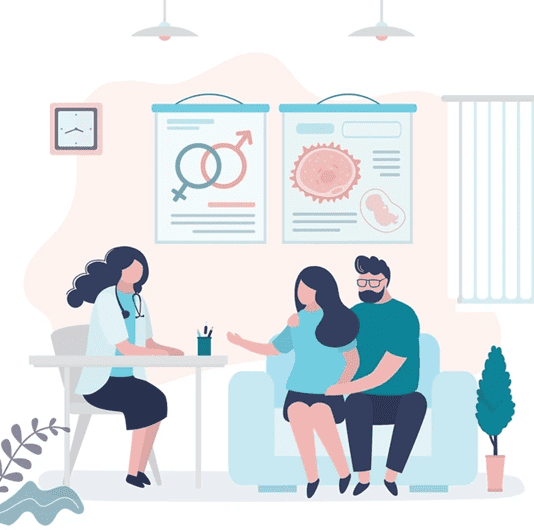
When you’re going through IVF and have had a blastocyst transfer, keeping up with check-ups and getting the right support is super important to boost your chances of pregnancy after blastocyst transfer. Here’s the simple breakdown:
- Check-ups are Key: After your transfer, you’ll need to visit your doctor regularly. They’ll check things like embryo implantation and if your body is showing signs of pregnancy. Staying in touch with your doctor helps make sure everything’s going as planned.
- Help from Hormones: Your body might get a little help from medications like progesterone. These meds help your body be the best home for the growing embryo, boosting your chances of a successful pregnancy.
- Healthy Choices Matter: Eating right, staying active, and keeping stress low can help.
Remember, the journey to becoming a parent is a team effort with your healthcare providers. They’re there to guide and support you every step of the way, aiming for the best outcome.
Keep up with your health, follow your doctor’s advice, and stay hopeful. You and your medical team are working together towards the amazing goal of growing your family.
Conclusion
Undergoing blastocyst transfer as a part of the IVF process offers a promising path to parenthood. The success rates may range from 20% to 60% depending on various factors. Age, embryo quality, and overall health are some of them. It is crucial to stay active and informed throughout the journey.
Maintain a healthy lifestyle and stay relaxed. Pay regular visits to your doctors to monitor progress. At Nisha IVF, we’re dedicated to providing expert guidance and support to help you achieve your dream of becoming a parent.
Contact us today to learn more about your options and take the next step in your fertility journey.
FAQs
Why do some people conceive after IVF?
Some people conceive after IVF due to factors like embryo quality, age, and overall health. All these can affect the success of the procedure. Each person’s situation is unique, and success rates can vary.
How long after a blastocyst transfer can you get pregnant?
Pregnancy can occur as soon as six to ten days after a blastocyst transfer.
What is the optimal age for pregnancy after blastocyst transfer?
The optimal age for pregnancy after blastocyst transfer is typically under 35 years old.
How long should I wait for post-blastocyst transfer failure to get pregnant again?
It is recommended to wait at least one menstrual cycle before attempting pregnancy again post-blastocyst transfer failure.

